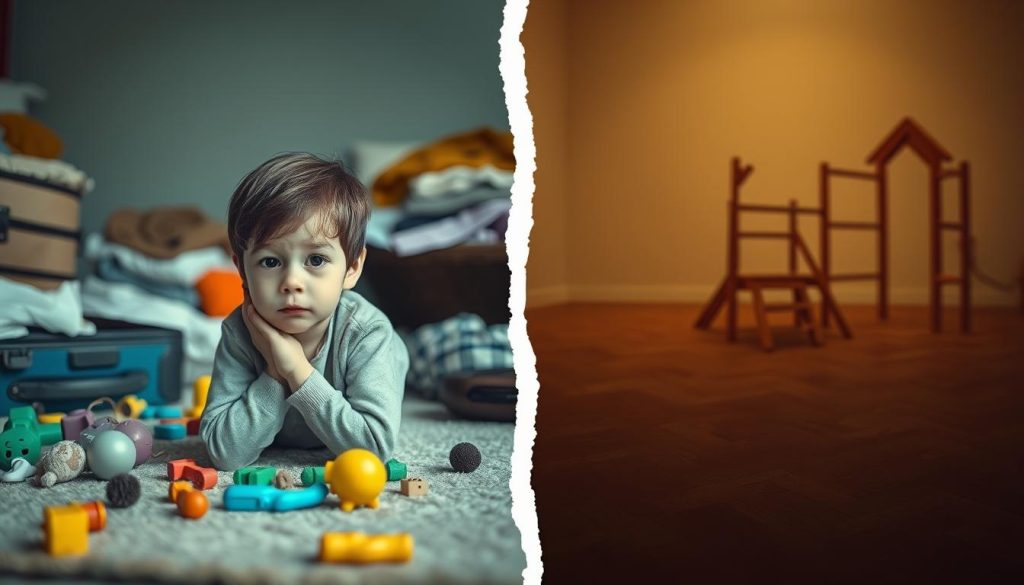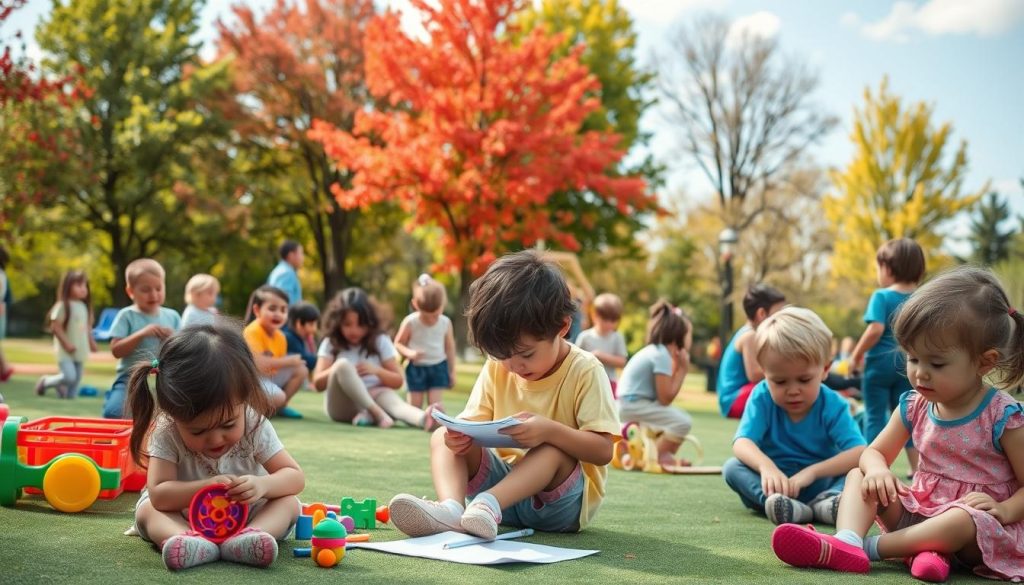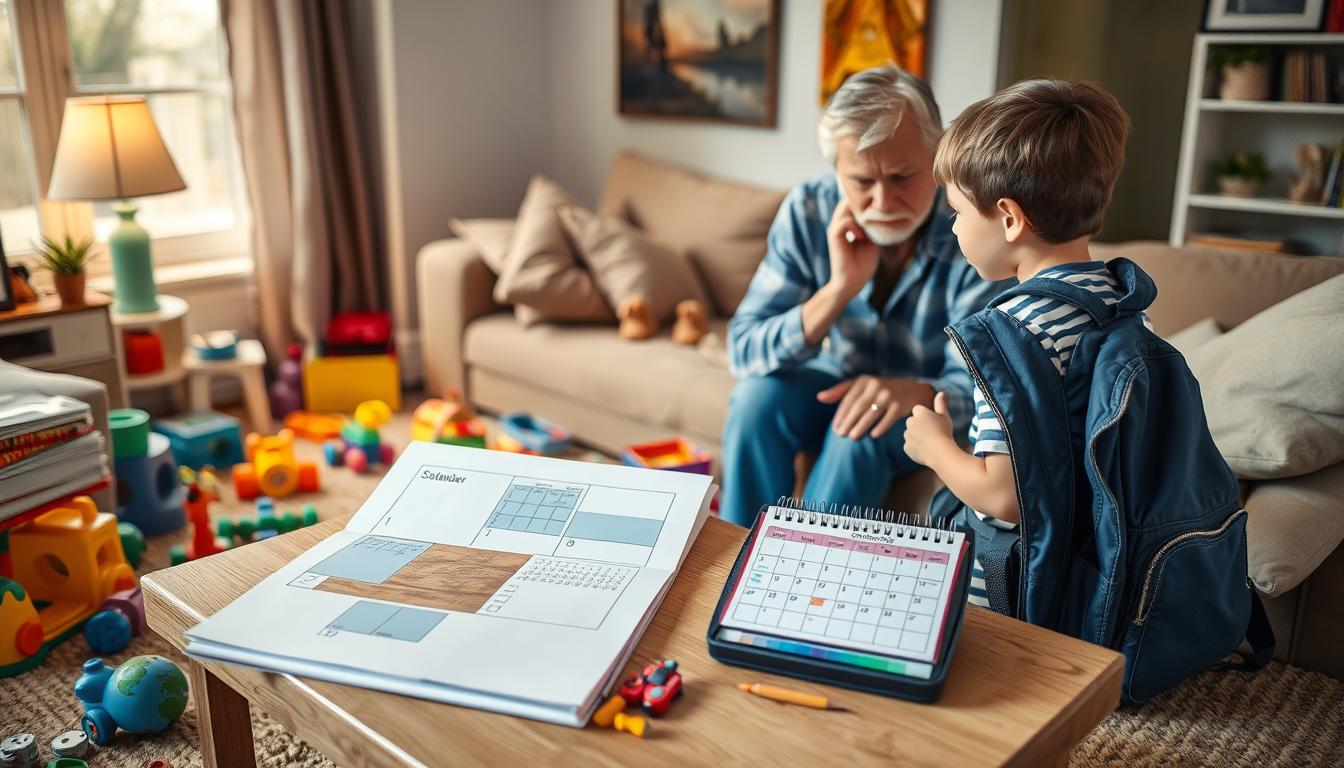Is your child’s lazy or forgetful behavior a worry, or just a normal part of growing up? As a parent, you might often wonder about this. It’s important to know if these behaviors mean there’s a problem or if they’re just a natural part of growing.
Children’s actions can be puzzling, from the quirks of stepchild relationships to the challenges of being a middle child. Talking to kids about puberty is key during their formative years. Experts say what looks like laziness might be a sign of disengagement. Forgetfulness could mean they’re going through important developmental stages.
Understanding these patterns can change how you parent. With the right knowledge, you can tell the difference between a child’s distraction and a real developmental shift. This helps you meet their needs better.
Key Takeaways
- Understanding children’s behavior can help in pinpointing the reasons behind perceived laziness or forgetfulness.
- Parenting challenges include navigating complex family dynamics, such as stepchild relationships and middle child syndrome.
- Talking to kids about puberty is essential, as this phase contributes to significant behavioral changes.
- Children’s actions might be influenced by their developmental stages, necessitating a closer look.
- Adopting an informed approach can help parents better address their child’s needs and promote healthy development.
Understanding Laziness and Forgetfulness in Children
It’s key to tell the difference between laziness and forgetfulness in kids. Big changes like divorce and children can affect their behavior. Divorce can upset a child’s routine, making it hard for them to remember things or try hard.
Also, divorce can make anxiety worse in kids. This can look like laziness. Helping kids with anxiety is important to understand this.

Some kids might act lazy or forgetful because of childhood eating disorders. Stress from these disorders can make it hard for kids to focus on their tasks.
Children with ADHD often have trouble staying focused and trying hard. They might forget things because they can’t handle long instructions. Breaking tasks into smaller steps can help them feel less overwhelmed and stay on track.
Forgetfulness starts early, around 4 or 5 years old, and gets worse in junior high. Kids might forget things like lunch, homework, or library books. If you always remind them, they might not learn to remember on their own.
Experts say teaching kids to do things without constant reminders is better. Encouraging them to learn from their mistakes and asking them questions can help them become more independent. This way, they not only remember better but also learn important life skills.
Common Behaviors and Their Meanings
Understanding what children do and why is key for good parenting. Kids often show their feelings and needs through actions, not words. This can include hitting, crying, or arguing.
It’s important to know if a child is being lazy or just distracted. Also, remember that forgetting things is normal as they grow.

Lazy or Just Distracted?
It can be hard to tell if a child is lazy or just not focused. Gentle parenting helps by making tasks easier and rewarding good work. For example, in coaching children’s sports, make games fun to keep them interested.
This way, what seems like laziness can actually be active participation.
Forgetting as a Developmental Stage
Forgetfulness in kids is not always because they’re not trying. Their brains are still growing, and they might forget things like cleaning up. This isn’t because they’re irresponsible, but because they’re still learning.
Using eco-friendly parenting strategies can help them feel more responsible. Activities like gardening or recycling can improve their focus and memory.
Parenting Challenges: Tackling Laziness and Forgetfulness
One big challenge for parents is dealing with kids’ laziness and forgetfulness. This issue often links to managing family life, like family budgeting, kids screen time, and dealing with sibling rivalry.

Experts say using the word “remember” a lot helps kids remember more. By focusing on memory, kids can start new habits in about three weeks.
Positive feedback is very important. Praise kids for remembering small things twice a day to boost their confidence. But, it’s important not to get angry or sarcastic when they forget. Positive words help more than negative ones.
Using technology can help too. Encourage kids to make task lists on computers. It makes remembering fun and engaging.
It’s hard to balance getting kids to do chores and school work, especially with sibling rivalry. Using natural consequences and clear communication helps kids understand their duties.
Many parents turn to online family therapy for help. It helps families create a supportive space where everyone contributes positively.
Being patient and setting clear rules is key. By consistently rewarding good behavior and letting kids face consequences, you can make your family happier and more united.
Effective Parenting Strategies and Tips
Using good parenting strategies is key to tackling laziness and forgetfulness in kids. These methods help kids feel responsible, boost their self-esteem, and improve their behavior. By using fun and engaging ways, you can motivate your child and help them develop good habits.
Making Chores Fun and Meaningful
Turning chores into fun activities can change how kids see responsibilities. Adding games or rewards can really help. Show kids that doing chores is good for their body and makes them strong. This makes chores fun and helps kids feel good about themselves.
Studies show that positive feedback works well. Giving lots of praise, hugs, and compliments can really motivate kids.

Implementing Natural Consequences
Teaching kids about natural consequences is important. When kids see the direct effects of their actions, they learn to be responsible. This method helps kids understand the impact of their choices.
Parents should change their parenting style as their child grows. This keeps discipline and lessons effective over time.
Strategies for Improving Memory
Boosting memory can help kids remember things better. Doing activities that challenge their brain, like talking about drugs or complex topics, can improve memory. Scientists say talking to your child strengthens their brain, helping them learn and remember better.
It’s also important to take care of your mental health after having a baby. This affects how well you can use these strategies. It shows how important family well-being is.
Good parenting strategies help solve common problems and make a better family environment. By using these methods, parents can raise strong, responsible kids.
Conclusion
Figuring out if a child is lazy or forgetful can be tricky. It involves looking at many factors, like family changes and parenting styles. Experts say that kids who feel loved and supported do better at managing their feelings. This helps them stay calm and focused.
Starting from a young age, kids learn to control their efforts and emotions. This skill is key for growing up and handling life’s challenges. It helps them think better and behave well.
To help your child overcome laziness and forgetfulness, try the tips from the article. Positive parenting and teaching kids to control their efforts are important. Also, making home chores fun can help your kids enjoy helping out.
It’s also vital to keep an eye on your child’s time online. Social media can distract them from important tasks. Sports can also help kids stay active and focused, balancing fun with responsibility.
By using these methods, you can help your child succeed in today’s world. They will not only stay busy but also thrive in their personal and social lives.
FAQ
What are some common signs that my child is not lazy but just forgetful?
How can divorce and family dynamics influence my child’s behavior?
How do I address sibling rivalry effectively?
What gentle parenting techniques can help with a child who seems lazy or disengaged?
How can I teach my child about consent and body positivity to help improve their self-esteem?
What are effective ways to manage my child’s screen time to improve focus?
How can family budgeting affect my child’s perception of responsibilities?
What strategies can I use to improve my child’s memory?
How can addressing postpartum mental health improve my parenting approach?
How do puberty and middle child syndrome affect a child’s behavior?
What is the role of coaching children’s sports in developing responsibility?
This post contains affiliate links. If you click on a link and make a purchase, I may earn a small commission — at no extra cost to you. Thank you for supporting this blog and helping me keep the patterns free! Read the full Affiliate Disclosure & Transparency.
